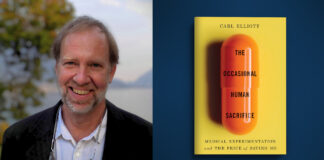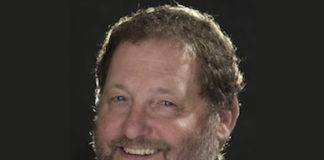Tag: clinical trials
Our Medical System Protects Wrongdoers and Punishes Whistleblowers: An Interview with...
MIA’s Ayurdhi Dhar interviews Carl Elliott about scandals in psychiatry and the challenges faced by whistleblowers.
Antidepressant Trials “Hijacked for Marketing Purposes,” Researchers Say
About half of the large antidepressant trials are biased enough to be considered “seeding trials,” according to the researchers.
Jon Jureidini–Evidence-Based Medicine in a Post-Truth World
In this interview, Jon Jureidini talks about the issues with evidence-based medicine and describes what led to the debasement of a system originally conceived to challenge extravagant claims and poor science.
Jim van Os and Peter Groot: When Assessing Antidepressant Withdrawal Methods,...
Jim van Os and Peter Groot discuss their paper: “Successful Use of Tapering Strips for Hyperbolic Reduction of Antidepressant Dose: A Cohort Study” published in the journal Therapeutic Advances in Psychopharmacology.
How Do We Know When a Treatment Works? A Primer on...
Discussing informed consent, risk/benefit ratios, and the many sources of bias in clinical trials for drugs, in order to help the layperson better understand the research.
Antipsychotic Trials Show Increasing Placebo Response and Declining Drug Response
A new review of antipsychotic trials conducted over the last 24 years finds that the placebo response rate is steadily increasing, and drug response is decreasing.
Pooling Data May Hide Negative Outcomes for Antidepressants
A new study, published in Psychological Medicine, found evidence for a specific type of publication bias distorting the evidence about antidepressant efficacy.
Less Than Half of Clinical Trials Comply with Legislation to Accurately...
A new study finds that sponsors of clinical trials in the EU continue to fail at reporting their results as required by recent legislation.
Reanalysis of STAR*D Study Suggests Overestimation of Antidepressant Efficacy
Reanalysis of the original primary outcome measure in the STAR*D study suggests STAR*D findings inflate improvement on antidepressant medication and exclusion criteria in conventional clinical trials results in overestimation of antidepressant efficacy.
The Truth About “Breakthrough” Drugs
From The Washington Post: "When federal regulators started giving certain drugs 'breakthrough' status in 2012, pharmaceutical company interest exploded.
The goal was to speed up...
FDA Shakes Up Guidance on Antidepressant Trial Design
From MedPage Today: "The FDA released new draft guidance for development and testing new pharmacologic agents indicated to treat major depressive disorder (MDD).
For example, the new guidance...
Ethicists: Access Needed After Brain Implant Clinical Trials
In a new study, Baylor College of Medicine researchers have raised ethical questions about clinical trials of deep brain stimulation (DBS) and other brain implants.
"'Generally,...
New Site Names Companies Who Fail to Report on Clinical Trials
From Pacific Standard: The U.S. government has never penalized anyone for breaking a law that requires institutions to report the results of clinical trials. A...
It’s Time to Levy Penalties for Failing to Report Clinical Trial...
From STAT: A decade after the Food and Drug Administration Amendments Act went into effect, requiring the results of clinical trials to be reported on the government website ClinicalTrials.gov, the government has never levied a single monetary penalty or withheld research funding under the law.
Failed TB Vaccine Exposes Concerns Regarding Research Ethics
An investigation exposes violations to research ethics, finding that researchers failed to disclose risks and even misled government agencies.
Irving Kirsch: The Placebo Effect and What It Tells Us About...
Dr Irving Kirsch is Associate Director of the Program in Placebo Studies and lecturer in medicine at the Harvard Medical School and Beth Israel Deaconess Medical Center. He joins us this week to discuss his research into the placebo effect and what it tells us about the efficacy of antidepressant drugs.
The State of the Evidence Base for Current Medical Products
In this post for Yale Law School's CRITical Thinking, Tom Jefferson discusses some of the factors that currently serve to undermine rational and ethical medical...
John Read: What the Science and Evidence Tell Us About Electroshock
Professor John Read talks about his research interests and in particular, the science and evidence base for Electroconvulsive Therapy (Electroshock).
Jim Gottstein: Patient Rights in Mental Healthcare
Jim Gottstein, president and founder of the organisation Law Project for Psychiatric Rights, talks about his own experiences with the psychiatric system, patient rights in mental healthcare and the recent trial between Wendy Dolin and the UK Pharmaceutical manufacturer GlaxoSmithKline.
Peter Gøtzsche: The Pharmaceutical Manufacturers Dominance of Mental Healthcare
Professor Peter Gøtzsche is Director of the Nordic Cochrane Centre in Denmark and discusses his background in research, his views on antidepressant prescribing and how pharmaceutical manufacturers have influenced mental healthcare.
Robert Whitaker: The Astonishing Rise of Mental Illness in America
We discuss Robert's 2010 book, Anatomy of an Epidemic, which is arguably the definitive account of the realities of psychiatric drugs and completely lays bare the astonishing rise in mental ill health despite the availability of psychiatric drugs.
Peter Groot: A Novel, Practical Solution For Those Withdrawing From Psychiatric...
Doctor Peter Groot from the User Research Center of the Maastricht University talks about Tapering Strips, which help users who want to withdraw from their psychiatric drugs safely and in a controlled way.
David Healy: Making Medicine Safer for All
Doctor David Healy from Bangor University in Wales talks about prescribing practice, medicine safety and pharmaceutical regulation.
Terry Lynch: Why Psychiatry Has Pursued a Purely Medical Approach to...
Doctor Terry Lynch is a GP, psychotherapist, author and mental health educator. Ten years into his career as a GP, he became very concerned about the medical approach to emotional and mental suffering and was not prepared to remain silent.
‘Salami Slicing’ Found in Analyses of Antipsychotic Trials
Evidence of duplicate publishing in articles analyzing data from clinical trials testing second-generation antipsychotics for depression

































